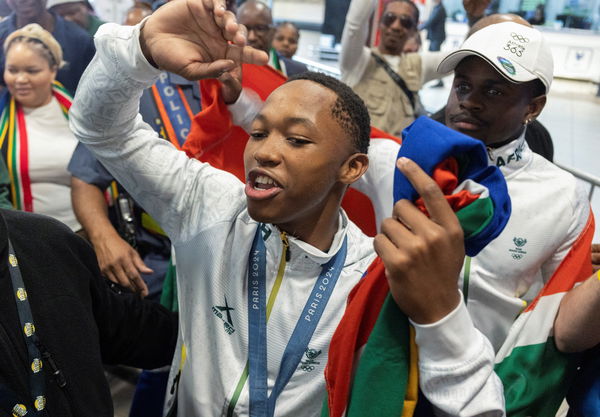
Imago
Image Credits: Instagram/@mergesphereza and @baya_the_great

Imago
Image Credits: Instagram/@mergesphereza and @baya_the_great
South African sprinting entered this season with a burst of promise, as 19-year-old Bayanda Walaza produced headline performances at every level of competition. He secured a three-medal finish at the FISU World University Games in Bochum, followed by a runner-up placing in Brussels, where he pushed compatriot Gift Leotlela to the line. For a nation eager to see its next great sprinter emerge alongside Akani Simbine, Walaza seemed poised to step into the senior world stage with confidence. Yet, in his final outing before the World Championships, hopes took an unexpected turn.
Watch What’s Trending Now!
At the Diamond League Final in Zurich, the men’s 100 meters assembled a field stacked with global medalists. Simbine found form at last, dipping under 10 seconds to claim silver in 9.98, one hundredth behind American Christian Coleman. Jamaica’s Ackeem Blake was third in 9.99, while Shaun Maswanganyi, the third South African in the race, crossed in 10.19 for seventh. The performance by Simbine was encouraging after several races above the 10-second barrier, yet the outcome of the evening revolved around the youngest South African on the track.
ADVERTISEMENT
Walaza, placed in an inside lane, opened strongly and appeared to be in contention when disaster struck after 70 meters. He clutched at his hamstring, fought to complete the distance, and collapsed at the finish in visible pain. Medical staff removed him from the track in a wheelchair. The setback has placed his participation in next month’s World Athletics Championships in Tokyo in doubt, leaving South Africa’s relay strategy in jeopardy. Walaza is not only the nation’s double sprint champion from the World University Games but also a crucial starter for the 4x100m relay squad that won Olympic silver in Paris and followed with gold at the World Relays in China.
The injury alters the balance of South Africa’s sprinting ambitions. Simbine’s resurgence provides encouragement, yet the loss of Walaza weakens both the individual and relay prospects. His development this year suggested a breakthrough was possible, especially after victories over Thailand’s Puripol Boonson and other rising names in Bochum. “The more I do not perform now, it makes me hungrier, and it is what makes me stronger when I come back,” Walaza had said earlier in the season. That hunger may now be tempered by the demands of recovery.
ADVERTISEMENT
Injury for Bayanda Walaza 🇿🇦 in the men’s 100m Diamond League final.
His last race before the World Championships… pic.twitter.com/5YQAz07yUV
— Track & Field Gazette (@TrackGazette) August 28, 2025
Elsewhere in Zurich, South African athletes produced mixed results.
ADVERTISEMENT
Jo-Anne du Plessis, the Olympic javelin silver medalist, recorded 62.26 meters for third behind Greece’s Elina Tzengko at 64.57. Middle-distance runner Prudence Sekgodiso placed sixth in the women’s 800 in 1:58.57, while hurdler Zeney van der Walt ended eighth in 56.90. The evening’s attention, however, rested on the contrasting fortunes of Simbine and Walaza: One reclaiming international competitiveness, the other facing the uncertainty of an untimely injury.
Now, Walaza’s hamstring injury in Zurich has cast doubt over his World Championships debut and South Africa’s relay hopes.
ADVERTISEMENT
Bayanda Walaza’s Zurich heartbreak leaves South Africa holding its breath for Worlds
The injury brought an emotional outpouring, with one supporter writing, “🥹🥹🥹🙏🏽🙏🏽🙏🏽🙏🏽 sending our boy some love 💝 🇿🇦🙏🏽.” This reflects the national sentiment toward Walaza, who at just 19 had emerged as South Africa’s brightest new sprinting prospect. His collapse in Zurich not only shocked spectators but also evoked sympathy, as many see him as central to the country’s athletic future.
ADVERTISEMENT
The reaction, “Oh no😢,I wish him speedy recovery,” mirrors the uncertainty now surrounding his immediate career. With the World Championships just weeks away, Walaza’s hamstring issue leaves his participation in jeopardy. Fans’ concern is less about his performance in Zurich and more about whether this setback will deny him the opportunity to debut on the senior global stage.
Echoing similar concerns, another track enthusiast added, “I hope it’s nothing serious and he’ll be at the World Championship.”
ADVERTISEMENT

Reuters
Bayanda Walaza, a member of the South African athletics relay team that won a silver medal, reacts after arriving from the Paris 2024 Olympics at OR Tambo International Airport, in Johannesburg, South Africa August 13, 2024. REUTERS/Alet Pretorius
One viewer noted, “He was flying though. Was going to win that one.” This captures how competitive Walaza appeared in the race’s opening phases. Running from an inside lane, he accelerated smoothly and stayed alongside established global medalists. That sense of potential victory, cut short by injury, added to the collective frustration, as spectators believed he had the form to beat experienced names in Zurich.
Another post read, “This broke my heart coz I saw he was in the lead, he actually had a chance to win it. Speedy Recovery our star boy. We need to see you at the World Championships next month.” Such a take not only portrays disappointment at his misfortune but also hope. Walaza’s visible command in the early meters reinforced the impression that he was capable of challenging Christian Coleman and Akani Simbine before the injury ended his bid.
ADVERTISEMENT
The comment, “Hope he gets better. Walaza would be great representation for south africa along with simbine,” highlights the broader context of the nation’s sprinting ambitions. Simbine’s sub-10 return in Zurich confirmed his resurgence, but Walaza was seen as the emerging counterpart who could join him on both individual and relay stages. His absence would leave South Africa reliant on experienced names rather than the new generation.
A final message, “Hopefully Bayanda will have recovered before the World Championships,” points directly to the tight timeline. With Tokyo hosting the competition in just a few weeks, the priority now shifts from performance assessment to medical recovery. Bayanda Walaza’s role is considered vital not only for his 100m campaign but also for the relay squad that relies on his explosive starts.
ADVERTISEMENT
ADVERTISEMENT
ADVERTISEMENT